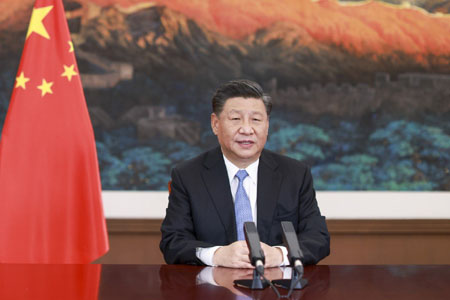Special to WorldTribune.com
In a self-congratulatory and hubristic speech to the nation, China’s President and Communist Party supremo Xi Jinping praised the efforts of the People’s Republic to overcome the Wuhan virus and to create a powerful Chinese economy amid global downturns.
Chairman Xi boasted that this is “the first major economy worldwide to achieve positive growth,” despite the corona virus pandemic. Since the onset of the deadly virus in March, countries around the world have faced lockdowns, limited manufacturing, and seen widespread small business shutdowns. The pandemic has wreaked global calamity and disruptions not seen since the 1930’s Depression or the Second World War.
But China somehow has largely ducked the bullet.
Xi’s speech was notable not for what it said, but what it chose not to say; gone was the ominous rhetoric towards Taiwan as in his 2019 address, nor were there any hints of the acrimonious political relationship between Beijing and Washington.

“I am proud of our great motherland and people as well as the unyielding national spirit,” Xi said in a recorded video, “with solidarity and resilience, we wrote the epic of our fight against the pandemic.”
But is Beijing’s propaganda bravado hiding the cost of the pandemic even in China?
Yet the true extent of the virus infection and mortality rate in the epicenter Wuhan and throughout China for that matter is unknown. Coverups and misinformation are common in Beijing’s playbook. Early in the crisis, Dr. Li Wenliang tried to warn his colleagues in Wuhan about an outbreak of a virus and was among a group visited by the police; he later died in hospital.
Significantly the short speech was a kind of a legacy victory lap for Xi who is nearing the end of his formal second term in power. Perfunctory praise for the comrades fighting the virus, for the workers keeping China’s production flowing, and for its scientific successes; breakthroughs in scientific explorations like the Tianwen-1 Mars Mission and the Chang-e 5 Lunar Probe.
The key theme was focused on the upcoming 100th anniversary of the Chinese Communist Party (CCP). Founded in Shanghai, the once small and conspiratorial Party would after a quarter century morph into the ruler of the vast Chinese Mainland. The Party’s myth and legend remains the grist of the People’s Republic’s history and stands sacrosanct.
The CCP remains a singular and pivotal force in control and rule over China. It’s a political talisman for Xi Jinping and a generation of leadership which has seen China prosper through economic reforms and world trade but nonetheless keep unquestioned authoritarian control of its society.
A new pamphlet “Xi Jinping’s Thought on the Rule of Law” is now emerging as the central tool in the attempt to elevate the status of the Chinese President as a Marxist ideologist no less important than Lenin, Stalin, or Chairman Mao. Whether this would work, or Xi will gain immortal status in the iconography of the CCP regime remains an open question recounts the respected BitterWinter.org site. Not since the rule of the dictator Mao has China witnessed such a strongman.
Naturally all this is leading to Xi’s investiture at next year’s CCP Congress to an unprecedented third term in political power.
Currently the CCP, China’s undisputed governing force, has 92 million members well below ten percent of the population but effectively controlling the entire country. Membership standards remain rigorous and rooted in ideology, but offer lucrative business connections. Last year, Cai Xia a retired professor of CCP’s Central Party School, vocally criticized General Secretary Xi Jinping, comparing him to a “mafia boss” and the ruling CCP as a “political zombie.”
In classic communist lexicon Xi extolled, “A journey of comprehensively building a modern socialist country is about to start … The road ahead is long; striving is the only way forward.”
Xi’s task this year is focused on socio/economic rebuilding after Covid-19; thus he’s recalibrating China’s development goals both domestically and globally and also setting the stage for China, assumed by some economists to be the second largest global economy, to solidify its standing in the post pandemic era.
China lives and thrives on the oxygen of world trade and open markets, something drastically disrupted by the pandemic and now the smoldering political resentments and reevaluation many countries have in dealing with a repressive, dominant and militarily powerful People’s Republic. Beijing’s new trade deal signed with the European Union underscores its widening commercial agenda.
The real test will come if the USA naively returns to business as usual with China.
John J. Metzler is a United Nations correspondent covering diplomatic and defense issues. He is the author of Divided Dynamism the Diplomacy of Separated Nations: Germany, Korea, China (2014). [See pre-2011 Archives]

 By
By